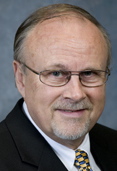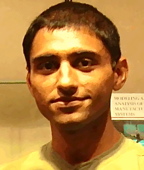EIT Team to Probe Social Media Role
A $742,044 National Science Foundation (NSF) grant will finance research by two information scientists at UALR’s Donaghey College of Engineering and Information Technology (EIT) on how blogs, Facebook, Twitter, and other social media influence group actions.
Dr. Nitin Agarwal, assistant professor of information science, and Rolf Wigand, UALR’s Maulden-Entergy Chair and Distinguished Professor of Information Science and Management, will share the grant from the National Science Foundation’s Social-Computational Systems Program with Arizona State University colleague Dr. Merlyna Lim.
The UALR team will receive $402,191, and the Arizona State group will receive $339,853.

Social media has played a substantial role in supporting collective actions– from the Arab Spring revolts in Tunisia, Egypt, Libya, and Syria to riots in London and other cities in England.
“Despite the pervasive act of labeling recent events as ‘Facebook revolution,’ ‘Twitter revolution,’ and ‘BlackBerry Messenger,’ there is very little in-depth research devoted to advance our understanding of online collective actions,” Wigand said.
The team’s grant proposal, “Cyber-Collective Movements: Novel Socio-Computational Approaches in Studying the Blogosphere,” will provide in-depth research devoted to advance understanding of online collective actions.
“Journalistic accounts on such actions are inevitably based on anecdotes rather than rigorously designed research,” the researchers said. “Existing computational studies focusing on capturing and mapping the interactions and issues prevailing in social media manage to identify the manifestations of collective actions. These, however, lack modeling and predictive capabilities.”

Members of underrepresented groups, especially female bloggers will play an essential role in the project. While research shows that three of four females online are active social media users, very little research attempts to understand social, cultural and political roles of female bloggers and collectivity among female social groups.
The domain of female Muslim bloggers epitomizes an important contrast deserving attention, between socio-political systems where women are frequently denied freedom of expression.
“Female Muslim bloggers find the blogosphere as a digital recourse to exercise their freedom of speech if compared to their physical and repressively controlled spaces,” the research team said. “Insights from our study on specific blogger demographics such as female Muslim bloggers would shed light on the idiosyncrasies of their socio-technical behavior, thus making a significant impact on society at large.”
The new study will be a longitudinal look at the blogosphere. It will develop theoretical underpinnings and experimental tools to examine the factors that govern the success and failure of cyber-collective movements.
Essential questions to be addressed in the study are:
- What transforms individual sentiments into collective sentiments?
- What are the dynamics of various socio-cultural dimensions in the evolution of opinion leaders?
- What social or organizational factors help transcend the nation-state barriers?
The researchers said several independent validation strategies will be investigated, including monitoring how cyber-collective movements manifest themselves as physical social movements, human evaluation, and crowdsourcing initiatives. Crowdsourcing is the act of taking a job traditionally performed by a designated individual and outsourcing it to an undefined, generally large group of people.
The UALR scientists said the findings from the study including the data collected will be valuable for understanding human-computer interaction, game theory, political communication, social network analysis and mining, and social computing.
The research will be funded for three years through NSF’s Social-Computational Systems (SoCS) Program, a cross-disciplinary program between NSF’s Directorate for Computer & Information Science & Engineering and the Directorate for Social, Behavioral & Economic Sciences.
Only 5 percent of the grant applications submitted to the SoCS program were awarded.